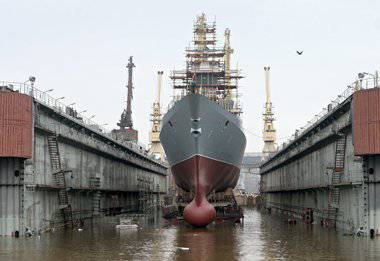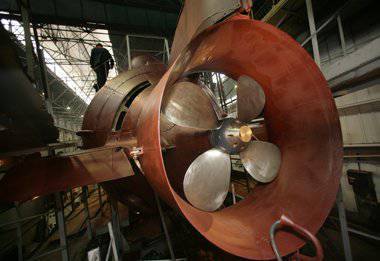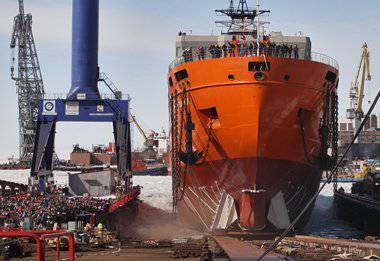We must be obsessed with reviving the fleet.
 Shipbuilding - a knowledge-intensive industry that unites almost all areas of knowledge - has been developing dynamically in recent years and is able to take the entire Russian industry to a new level.
Shipbuilding - a knowledge-intensive industry that unites almost all areas of knowledge - has been developing dynamically in recent years and is able to take the entire Russian industry to a new level.It is gratifying that in recent years the revival fleet is under constant attention from the government. The state arms program of Russia until 2020 was adopted. 5,3 trillion rubles are planned for the update of the Navy; the main projects of warships have been developed and are already at different degrees of readiness. Under the chairmanship of Vladimir Putin, meetings were held at which crucial decisions for the fleet were adopted. One of the most memorable meetings took place two years ago at the Admiralty Shipyards, the contours of military shipbuilding for the coming decades were marked on it.
Our scientific and production facilities allow us to complete our tasks. Although all, of course, not as smooth as we would like. The losses of 90-x are too great, when together with the Soviet Union they almost destroyed the shipbuilding industry. And yet, at 2000, our enterprises, mostly, kept afloat, retained the research and production potential and specialists - and are now ready to make a decisive step forward. The main thing - to strengthen the technological culture. Much has already been done for this.
Even with financiers, we now speak the same language. They understood that the ship could not be built in one quarter, funds should arrive on time and not in the last months of the year. After all, in the production - as in life: if you do not feed a person for a week, and on Sunday to give a bucket of borscht - no one will digest it. There is a technological schedule where the main stages of the construction of any vessel are fixed: R & D, design and technological preparation of production, purchase and supply of component equipment, weapons, metals, fittings - and the production process itself. There is also a temporary grid indicating the percentage readiness of the ship at each stage and the necessary funding. And then at any time you can find out at what point the construction is located, where the bottlenecks are, how much money is needed and what needs to be done. When a customer advances and repays each stage on time under the strict control of military representatives, enterprises do not need to get into loans, pay bank interest. Everything is clear, convenient, profitable, reliable - and for the Navy, and for the shipyard. When exporting orders, we always work according to this scheme. And if our shipowner builds at shipyards in Korea, he immediately provides 80% with additional delivery funding, whereas in Russia he considers it possible to give 30% or 50%. I am in charge of discipline: so that the customer is responsible for the late financing, the contractor for the outstanding work. Once the contract is signed on both sides, the responsibility should be mutual.
No matter how much they say that the market will decide everything - without a clear production line from the ministry and the military industrial commission to a small enterprise producing ship rivets, the system will not work. The state defense order for this year is closed in many positions in November. The Defense Ministry says: you demand a lot of money. We answer: everything is calculated, there are planned calculations of all costs, let's check together or look at international experience - the calculation of the selling price. In the world market, a diesel submarine, conditionally, is worth 200 million dollars. Pay. And then the customer does not need to know what the cost of a standard hour for a turner 5 discharge, output, interest, overhead. The defense department all the time reproaches, for example, Sevmash that it contains a recreation center, a farm. And what means to keep them? Enterprise - city-forming. Municipal structures pull all social programs? Do they have enough money in the budget? These issues, of course, should be resolved by the state. And above all - to provide work colossal production capacity.
It is not clear to us why the largest in Europe slipways of the Admiralty shipyards and the Baltic Shipyard, on which everything can be built, from bulk carriers to heavy cruisers, are empty today. Given that the programs, which imply a very dense workload of enterprises, have been adopted, and it is high time to start their implementation. We, due to a certain inertia accumulated over the past decades, cannot yet work from paper, like Korean and Japanese firms. We need a temporary reserve for production preparation. Yes, you need to strive for the pipeline, as in the western shipyards, but for this, every plant working for the fleet must represent the load for the foreseeable future in order to update the machine park in time, to carry out the retraining of specialists. If serial construction begins - two dozen vessels of a different class each year, as it was before, the plants will begin to invest in new technologies. And to put hundreds of research and production teams into the fulfillment of a single order - not a single economy will survive. After all, the costs directly shipyard in the price of the ship with us, as well as throughout the world, about 1 / 3. And the rest is spent on components, subcontractors.
 We look forward to competitions for the construction of three linear diesel-electric icebreakers in the near future, then nuclear ships with a capacity of 60 megawatts and an 110 megawatt Leader super icebreaker. It is important that Russian companies order a fleet mainly in domestic shipyards. Then the plants, except for quality and reliability indicators unified for all world shipyards, will have an incentive to offer a certain bonus in comparison with import competitors: to build faster, cheaper for their own or, for example, improve performance, increase speed on 0,1 – 0,2 node, which important for the merchant fleet.
We look forward to competitions for the construction of three linear diesel-electric icebreakers in the near future, then nuclear ships with a capacity of 60 megawatts and an 110 megawatt Leader super icebreaker. It is important that Russian companies order a fleet mainly in domestic shipyards. Then the plants, except for quality and reliability indicators unified for all world shipyards, will have an incentive to offer a certain bonus in comparison with import competitors: to build faster, cheaper for their own or, for example, improve performance, increase speed on 0,1 – 0,2 node, which important for the merchant fleet.By design, our projects have been and remain on top. This is a merit of both the developers and the specialists of the Krylov State Research Center, where for more than 115 years all Russian marine equipment has been tested and refined.
Another thing is that our design bureaus are more inclined to military shipbuilding, and at this stage it would be useful to create a single design office for the civilian fleet, for example, as part of USC. The big plans to upgrade transport and special courts, and the program of international cooperation with, say, South Korea - in the Far East and St. Petersburg, are pushing for this.
For the Soviet fleet dozens of projects were built simultaneously. Today there are fewer of them. In the surface fleet, head corvettes and frigates are already prepared (the developers of Almaz Central Design Bureau and the Northern Design Bureau). Corvette - for the near zone, frigate - for the sea. For the ocean zone requires new destroyers and large anti-submarine ships. And so that Russia could demonstrate its flag in all areas of the world's oceans, the project of the future heavy aircraft carrier cruiser (traditional developer - Nevskoye PKB) is being considered.
There is a good news from USC - the construction of ships and ships from nitrogen steels begins: they are practically non-magnetic and behave well both at low temperatures and at high temperatures.
Much more difficult task is the electronic filling of marine equipment. On civilian vehicles, our shipowners have long been addicted to imported electronics. But after all on military orders there was not a single overseas bolt before. And now, despite all the understandable difficulties with ship control systems, electronic “brains” providing decision-making complexes, one must be extremely careful. We can not allow our combat team to be immediately deciphered by someone and transferred to another state. We need our own domestic element base, microelectronics, breakthrough technologies. The other day, on a scientific and technical society, our instrument makers quite reasonably reported on their developments. But for their implementation requires both money and time. In the meantime, we are lagging behind in radio electronics and information technology years 20 years - our development has slowed down sharply due to the collapse of the scientific and industrial complex of the Soviet Union. Of course, in recent years, designers and specialists have learned a lot, but shipbuilding does not work as a single balanced organism. We are only getting closer to this.
There is an expert council led by Academician Peshekhonov, who works for the future, and they began to listen to the opinion of experts under Putin. The first results appeared. The state allocated money, and the Northern Design Bureau designed the gas carrier, not inferior to foreign ones. Far East shipyards under construction will accept this order. The shipbuilding and ship repair center began to create a modern metal processing line, special bending equipment - to buy it abroad is insanely expensive. In addition, we in Russia have powerful factories that can manufacture relevant presses, bending rolls, and technological lines. Although the machine tool industry, unfortunately, for two decades, almost buried, and much has to start over. We probably correctly left the semi-natural economy at each plant. Now the lion's share is purchased from subcontractors. It is only important that in the market conditions it would be beneficial for them to carry out orders for the fleet. And for this, again, it is necessary to build in series, not piece.
 Additional shipyards will be required to carry out government programs to upgrade the fleet. One is being built in the Far East, the other is being designed in Kronstadt. A new dry dock is needed in Severodvinsk. And not only for submarines, but also for large surface ships. For example, we will not be able to build an aircraft carrier on the existing stocks, but at the promising capacities in Kronstadt and Severodvinsk - quite. At the same time, I am personally convinced, and the majority of St. Petersburg shipbuilders agree with me: historical At the sites of the Baltic Shipyard and the Admiralty Shipyards, it is more profitable to preserve ship production, and not to follow the lead of the privatizers, turning workshops into business centers or elite residential areas. There are almost more business centers in St. Petersburg than bakeries, and you can count on one hand the enterprises capable of producing competitive products! A month ago, the intervention of the prime minister was required to save the Baltic and Proletarian plants from bankruptcy!
Additional shipyards will be required to carry out government programs to upgrade the fleet. One is being built in the Far East, the other is being designed in Kronstadt. A new dry dock is needed in Severodvinsk. And not only for submarines, but also for large surface ships. For example, we will not be able to build an aircraft carrier on the existing stocks, but at the promising capacities in Kronstadt and Severodvinsk - quite. At the same time, I am personally convinced, and the majority of St. Petersburg shipbuilders agree with me: historical At the sites of the Baltic Shipyard and the Admiralty Shipyards, it is more profitable to preserve ship production, and not to follow the lead of the privatizers, turning workshops into business centers or elite residential areas. There are almost more business centers in St. Petersburg than bakeries, and you can count on one hand the enterprises capable of producing competitive products! A month ago, the intervention of the prime minister was required to save the Baltic and Proletarian plants from bankruptcy!Without the stocks of the Baltic when updating the fleet is not enough. As well as without the Admiralty shipyards, where they planned to pave a street right across the territory of workshops and boathouses. But even without the Proletarsky Plant, the industry cannot be saved - it is there that unique machines for shipbuilding are made. What is worth at least a system of takeoff and landing on the deck of an aircraft carrier! And if, God forbid, Electrosila or the Kirov factory begins to be in a fever, other enterprises will supply nobody with sets of electrical equipment, turbines, reactor installations, pumps, compressors. On one case, without filling, you can not swim away!
That is why we should talk about the system: both within our industry, and between shipbuilders, affiliated companies and local authorities. In the Soviet Union, such interaction was. The Central Committee and the government set tasks, and all the necessary things were handled by the regional committees and planning commissions. For example, information was received that the Baltic Shipyard would receive orders for a series of nuclear-powered icebreakers and heavy cruisers; he needs two thousand workers who need housing, transport, schools, vocational schools. Advanced training institutes, shops, canteens, houses of culture, clubs appeared. Serious attention should be paid to such coordination.
Shipbuilding is a collective work. Thank God, we managed to keep the backbone of highly qualified specialists. They need to create normal working conditions, give decent wages, ensure growth prospects. Young people - to teach, mentors - to encourage, labor dynasties - to support and promote.
And of course, there should be no spontaneous decisions on the appointment of leading cadres. The director of the shipyard is a piece trade. Along with professional training, a person must have God's gift, be able to see prospects, feel problems, be faithful to the Motherland, fleet, and his team. If a person has only zeros in his eyes in anticipation of his own profit - the price is worthless. And then, as soon as a new leader appears, as a rule, it changes to 30% of managers who need to get used to it, get up to date, gain credibility. Even in the Soviet years, when the foreman was appointed, progressives were paid to the whole team over the course of the next year, so that the newcomer could stand up and start working effectively. Now there is a change of generations, young leaders come. Why not take advantage of the Soviet experience? In shipbuilding, it was assumed that the middle manager of one plant would go up to another, for example, from the post of the main builder - the chief engineer. Such an overflow of personnel was irrelevant; on the contrary, it ensured continuity. The preparation of managers seriously engaged in the ministry. Directors, as a rule, were raised from effective shop managers. The head of the central board was appointed from the most authoritative directors of the largest enterprises. Therefore, the industry spoke the same language, not in general terms, about improving efficiency, but specifically. Production is no easier than finance. Rather, on the contrary - you have to deal not with numbers, but with processes and living people, and for everything, including, by the way, numbers - you answer with your head.
Today in industry and in shipbuilding, in particular, is a turning point, much depends on the initiative and desire of the enterprises themselves. It is necessary to end the stage of crying, stories about difficulties - and move forward, restoring a single scientific and industrial complex.
The three-year budget is the first step to debugging the system. A ship less than three years is not built. Plus, the same amount should be thrown on the development. Although this “wake-up” scheme for performing tasks — first science, then design, and finally, construction — needs to be modernized first. Work in parallel, one year to six months ahead. And this will be entirely possible if all the links in the chain: customers, designers, shipbuilders, affiliates will be obsessed with one common idea - the revival of the fleet.
Everything you need: ideas, developers, production facilities, qualified specialists - in shipbuilding there.
Information